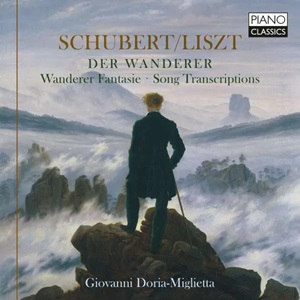
Franz Schubert (1797-1828)
Transcriptions by Franz Liszt (1811-1886)
Der Wanderer
Wanderer Fantasie, D.760, S.565a (1868)
Impromptus, D.899, S.565b, Nos 1 and 2 (1868)
Song transcriptions – see below
Giovanni Doria-Miglietta (piano)
rec. 2023, Imperia, Italy
Piano Classics PCL10271 [63]
Liszt’s enthusiasm for Schubert was genuine, deep and respectful. Leslie Howard’s complete Liszt series devotes three whole discs to Liszt’s transcriptions of Schubert works and there are others as well. Particularly important to Liszt was Schubert’s Wanderer Fantasy. Schubert wrote this, not exactly to commission but for a wealthy landowner who must also have been a competent pianist – he had been a pupil of Hummel. It is the most extrovert work Schubert ever wrote, showing off the resources of the piano in a way otherwise uncharacteristic of him. It is also unusual formally. Although Schubert called it a fantasy, it is in fact in a compressed version of sonata form, in four sections, which play continuously. The first section is a sonata form first movement but without a recapitulation, and two of the three subsequent sections rework the same themes. This is the origin of the cyclical themes used by later Romantic composers and of Wagner’s leitmotif technique. Liszt adopted it in his major work for the piano, which he did not hesitate to call a sonata.
Liszt also expressed his admiration for the Wanderer Fantasy through three reworkings of it. One was his recasting of it as a piano concertante work, S.366, which has often been recorded. He also arranged this for two pianos, S.653. However, here we are concerned with his revision of the original piano version. What he has done is quite discreet and for pages on end he makes no changes. However, he does enrich some of the writing, revise the layout of the climaxes, and rewrites the finale more extensively – Schubert himself confessed that he could not play this himself, and some of his writing is awkward. Liszt nowhere changes the musical substance. In listening to this I remembered that it is quite common for composers who are, for example, not violinists, to enlist the help of a violinist when writing a concerto, to ensure that what they write is playable and effective. Liszt has really done no more than perform the equivalent service for Schubert. Indeed, if a pianist played the Wanderer Fantasy in concert in Liszt’s version, I doubt whether anyone other than those who know it really well or have a score in front of them would notice the difference.
Also here we have a set of song transcriptions, including Der Wanderer, which provided one of the themes of the Wanderer Fantasy. Here Liszt does allow himself to elaborate, turning Schubert’s songs into miniature tone poems. These are a bit surprising, but they do not distort the music nor exploit it in the service of virtuoso display. That was not Liszt’s attitude to Schubert. The song texts are not included, but as they are not being sung, that seem fair enough.
Finally we have two of the Four Impromptus D. 899 in Liszt’s versions. In the E-flat one, No 2 of the set, he strengthens the middle section by substituting chords for some of Schubert’s single notes and by decorating the recapitulation. In No 3 he transposes it from G-flat to G natural, an easier key for amateurs to read, and also makes some additions to the texture.
These performances by Giovanni Doria-Miglietta are fluent and musical. They would not be a first choice if one were looking for the Schubert originals. I would rather go to Pollini or Perahia in the Wanderer Fantasy, Lupu or Brendel in the Impromptus and of course there are many recordings of the songs. But if you want to see how Liszt handled Schubert, this is a convenient way of finding out. The recording is good, if a little close, and the sleevenote, in English only, helpful.
Stephen Barber
Buying this recording via a link below generates revenue for MWI and helps us keep free access to the site



Song transcriptions
Du bist die Ruh, D.776, S.558/3
Das Wandern from Die schöne Müllerin, D.795, S.565/1
Aufenthalt from Schwanengesang, D.957, S.560/3
Wohin? from Die schöne Müllerin, S.558/11
Gretchen am Spinnrade, D.118, S.558/8
Der Doppelgänger from Schwanengesang, S.560/12
Ständchen von Shakespeare, D.889, S.558/9

















